Ministry of Tribal Affairs
Union Tribal Affairs Minister Sh. Arjun Munda announces ground-breaking partnerships for Tribal Development with ISRO, AIIMS Delhi, IIT Delhi, IIM Calcutta and IISc Bengaluru
Bhagwan Birsa Munda chair for tribal health and tele-medicine established at AIIMS-Delhi
Establishment of training facility in Semi-conductor Fab at IISc, Bengaluru for tribal students
Collaboration with ISRO to establish V-SAT Stations for connectivity in remote locations with tribal population
Bhagwan Birsa Chair established at IIT Delhi for tribal entrepreneurship; use of Industry 4.0 technologies
The initiative represents a concerted effort to leverage technology and expertise for the holistic development of tribal communities, promising transformative results in the days ahead: Shri Arjun Munda
Posted On:
07 MAR 2024 10:05PM by PIB Delhi
Union Minister for Tribal Affairs and Agriculture & Farmers’ Welfare, Shri Arjun Munda, presided over the launch of ground-breaking partnerships for tribal development, in New Delhi today. Collaborating with the Ministry of Tribal Affairs (MoTA) are esteemed institutions such as the Indian Space Research Organization (ISRO), Indian Institute of Science (IISc) Bengaluru, All India Institute of Medical Sciences (AIIMS) Delhi, Indian Institute of Management (IIM) Calcutta, and Indian Institute of Technology (IIT) Delhi. Letters of Intent were exchanged between the Ministry of Tribal Affairs and the eminent institutions to formalize partnerships in various key areas.
The partnerships will focus on key domains including Indigenous Practices; Telemedicine & Tribal Health; Training & Capacity Building; Entrepreneurship; Technology Transfer, Patent, IPR; and Digitization through Satellites; Use of Industry 4.0 Technologies (AI/ML, AR/VR) for tribal issues.
Speaking at the event, Shri Arjun Munda emphasized the significance of these collaborations. He highlighted ISRO's role in connecting remote areas, AIIMS Delhi's Bhagwan Birsa Munda Chair in medicine to focus on tribal health, including the Sickle Cell Disease Elimination Mission and the educational and research prowess of IISc Bengaluru and IIT Delhi. He expressed confidence in the program's objectives, stating that it will yield positive outcomes for tribal development.
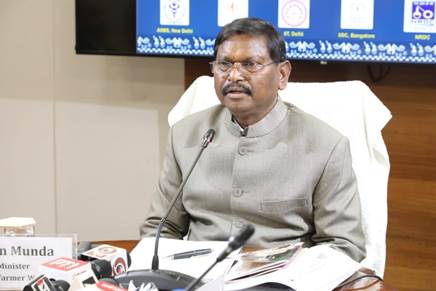
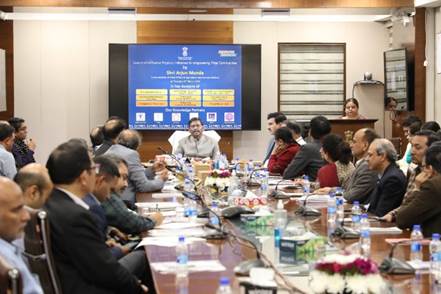
The Minister highlighted that the initiative represents a concerted effort to leverage technology and expertise for the holistic development of tribal communities, promising transformative results in the days ahead. He further said, "The past decade has witnessed significant and impactful decisions by our government in empowering tribal communities across India. Under the leadership of Prime Minister Shri Narendra Modi, the aim has been to establish sustainable livelihoods for India's tribal population. Initiatives such as PM-JANMAN and Viksit Bharat Sankalp Yatra were launched in Khunti district, Jharkhand, the birthplace of Bhagwan Birsa Munda, an iconic freedom fighter from the Tribal Community.”
The Government launched PM JANMAN with a total outlay of Rs 24 thousand crores, to comprehensively develop 75 Particularly Vulnerable Tribal Groups (PVTGs), that lag behind in socio-economic indicators of education, health, and livelihood. The Prime Minister also launched the National Sickle Cell Anaemia Elimination Mission in Shahdol, Madhya Pradesh, aiming to eliminate Sickle Cell Anaemia by 2047, which is prevalent in the Tribal Community. Similarly, the introduction of Eklavya Model Residential Schools aimed to provide quality education to tribal students with residential facilities, comparable to Jawahar Navoday Vidyalaya and Kendriya Vidyalaya Schools, even in remote areas of the country.
During the event, Shri Munda launched a coffee table book on PM JANMAN, a booklet on DAPST (Development Action Plan for Scheduled Tribes), and a booklet highlighting the 10-year achievements of the Ministry of Tribal Affairs.
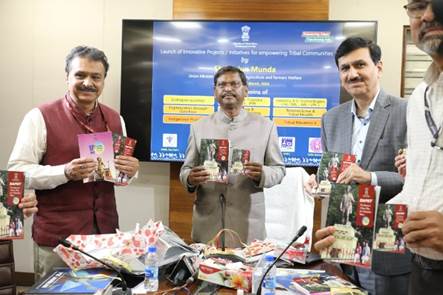
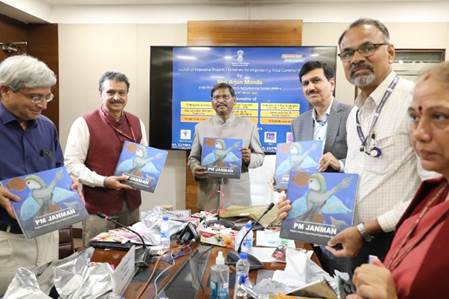
In his welcome address, Secretary (Tribal Affairs), Shri Vibhu Nayar welcomed the dignitaries and delineated the contours of the initiatives. He expressed his pleasure stating that the partnerships with ISRO, IIT Delhi, IISc Bengaluru, and AIIMS Delhi have connected the brightest minds of India with tribal affairs and tribal development. He emphasized that today is just the beginning, and specific workshops will be organized to address the problem statements of tribal people, providing them with solutions and opportunities for development.
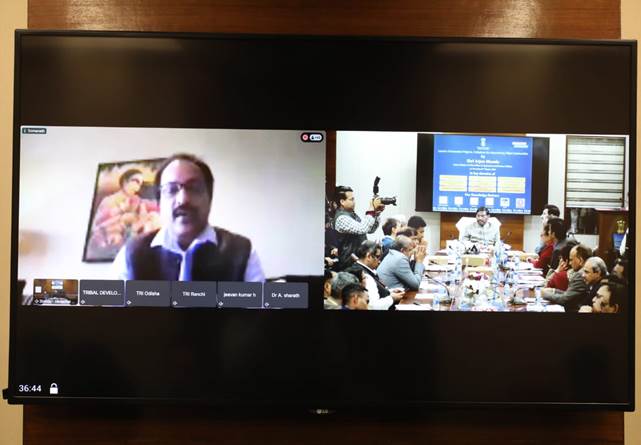
Chairman ISRO Shri S. Somanath, AIIMS-Delhi Director Prof M Srinivas, IIT-Delhi Director Prof. Rangan Banerjee, Director IISc, Bengaluru Prof. Govindan Rangarajan and Prof. Aditi Bhutoria, Coordinator, Centre for Entrepreneurship and Innovation (CEI), IIM Calcutta spoke on the occasion and highlighted their respective work in this respect and assured to make the partnership a success. Delhi University Registrar Prof. Vipin Tiwari, Smt. R. Jaya, Additional Secretary (Tribal Affairs), Shri Navaljit Kapoor, Additional Secretary (Tribal Affairs) and senior officials of the Ministry and other dignitaries were also present on the occasion.
Details of the programmes are as follows:
- Bhagwan Birsa Munda Chair of Tribal Health, Hematology & Tele-medicine at AIIMS, Delhi
The Ministry of Tribal Affairs has decided to establish the Bhagwan Birsa Munda Chair at AIIMS Delhi, India’s premier institute in healthcare and research, to enhance support for improving the health of the tribal population.
- The Chair will focus on conducting advanced research and teaching on tribal health issues, with a special emphasis on sickle cell anaemia, aiming to inform appropriate policy-making decisions.
- It will design and execute capacity-building programs for medical professionals, including last-mile caregivers.
- A telemedicine facility will be established to provide guidance to medical practitioners in the field and deliver high-quality medical care.
- Funding: The salaries of the Chair Members will adhere to UGC norms.
- The Chair will initially be established for 3 years and will be extendable based on mutual agreement.
- Establishment of Training in Semi-conductor Fab at IISc Bangalore:
The Indian Institute of Science (IISc), renowned for its research excellence, proposes to establish a training facility (Fab) to educate Scheduled Tribe (ST) students in semiconductor courses, providing 2100 NSQF-certified level 6.0 & 6.5 training. The programme includes:
- An Advanced Programme in Nano Science and Technology for 600 candidates over three years (200 per year). This programme, oriented towards job readiness, will involve collaboration with companies for student placements in the industry.
- A Foundation Programme in Nano Science and Technology for 1500 students (500 per year).
- Exposure programmes on the semiconductor sector for school and diploma students (100 students per year).
- Funding for this initiative will be provided through the Centre of Excellence (CoE) scheme of the Ministry. The project has been approved for a 3-year period, with a budget of Rs. 13.02 crores.
- IISc will submit an annual project report for fund release for the subsequent year. Renewal of the project will be considered based on successful achievements after the initial 3-year period.
- Collaboration with ISRO to Establish V-SAT Stations:
A gap analysis conducted by the Ministry of Tribal Affairs identified approximately 18,000 tribal majority villages with challenging accessibility due to remote locations and terrain. Inadequate mobile and internet connectivity in these areas hinders access to basic services.
- ISRO's satellite-based (V-SAT) solutions can significantly address these connectivity challenges. V-SAT stations can be static or mounted on vehicles.
- MoTA is partnering with ISRO to establish V-SAT stations at 80 Villages in 4 States on a pilot basis.
- These stations will offer Wi-Fi capacity of 100 Mbps, expandable to another 100 Mbps with boosters, enhancing connectivity and access to essential services for tribal communities.
4. Bhagwan Birsa Munda Chair at IIT Delhi for Tribal Entrepreneurship, Technology & Innovation:
The Ministry of Tribal Affairs is dedicated to promoting the socio-economic development of tribal communities in India, with a focus on empowering tribal youth through entrepreneurship and preserving indigenous practices through technology and innovation. The Bhagwan Birsa Munda Chair at IIT Delhi aims to:
- Develop a nation-wide entrepreneurship ecosystem for tribal youth.
- Provide comprehensive support for tribal youth entrepreneurs, including ideation, funding, incubation, branding, marketing, and access to national and international markets.
- Offer mentorship to tribal youth entrepreneurs through B2B meetings, entrepreneurship events, value-added courses, and support for incubation centres.
- Collaborate with relevant ministries/departments such as Startup India, SIDBI, MSME, M/o Agriculture, TRIFED, etc., to leverage existing schemes for promoting tribal entrepreneurship.
- Conduct research and development to promote indigenous practices through technology and innovation.
- Organize awareness drives and workshops in tribal areas through the Entrepreneurship Development Cell (EDC).
- Provide technical support in IP protection and application of tribal start-ups by IIT Delhi.
- Grant access to lab facilities to start-ups free of cost/nominal charges by IIT Delhi.
- Create a sustainable social impact through tribal enterprises/startups and raise awareness about entrepreneurship among tribal communities.
*****
NB/VM
(Release ID: 2012496)
Visitor Counter : 2548